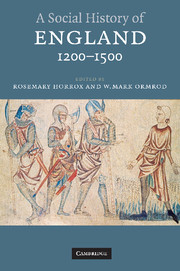Book contents
- Frontmatter
- Contents
- List of illustrations
- Preface
- List of contributors
- List of abbreviations
- 1 Introduction: Social structure and economic change in late medieval England
- 2 An age of deference
- 3 The enterprise of war
- 4 Order and law
- 5 Social mobility
- 6 Town life
- 7 The land
- 8 A consumer economy
- 9 Moving around
- 10 Work and leisure
- 11 Religious belief
- 12 A magic universe
- 13 Renunciation
- 14 Ritual constructions of society
- 15 Identities
- 16 Life and death: the ages of man
- 17 The wider world
- 18 Writing and reading
- 19 Conclusion
- Further reading
- Index
12 - A magic universe
Published online by Cambridge University Press: 05 June 2012
- Frontmatter
- Contents
- List of illustrations
- Preface
- List of contributors
- List of abbreviations
- 1 Introduction: Social structure and economic change in late medieval England
- 2 An age of deference
- 3 The enterprise of war
- 4 Order and law
- 5 Social mobility
- 6 Town life
- 7 The land
- 8 A consumer economy
- 9 Moving around
- 10 Work and leisure
- 11 Religious belief
- 12 A magic universe
- 13 Renunciation
- 14 Ritual constructions of society
- 15 Identities
- 16 Life and death: the ages of man
- 17 The wider world
- 18 Writing and reading
- 19 Conclusion
- Further reading
- Index
Summary
The late medieval universe as viewed from England could be described as a magic one in many senses. If we may define magic as ‘the exercise of a preternatural control over nature by human beings, with the assistance of forces more powerful than they’, it was indeed magic, for much of the surviving evidence expresses a sincere belief in the activity of supernatural powers superior to man, yet sometimes answerable to him. Such belief was central to Christian orthodoxy, to the establishment of the Christian priesthood, to its liturgy and its sacramental system, and to much of its judicial system. It was also helpful to the survival of much ‘popular’ magic. To the people of late medieval England, clergy and laity alike, supernatural influences underpinned all the most important aspects of human life. They were the food of love, the salve for anxieties, the source of healing and the means both to worldly success and to the ruination of enemies. Religious leadership worthy of the name must therefore prove that it had a beneficent relationship with these influences. The universe was magic also in accordance with a more restricted understanding of the word: through the fact, that is, that magicians were to be found operating within it, many of them loudly condemned by the orthodox Christian Church.
The existence of this state of affairs may call into question the application of the term ‘magic’ to both, for the latter appears to be the enemy of the former.
- Type
- Chapter
- Information
- A Social History of England, 1200–1500 , pp. 340 - 355Publisher: Cambridge University PressPrint publication year: 2006
- 1
- Cited by



